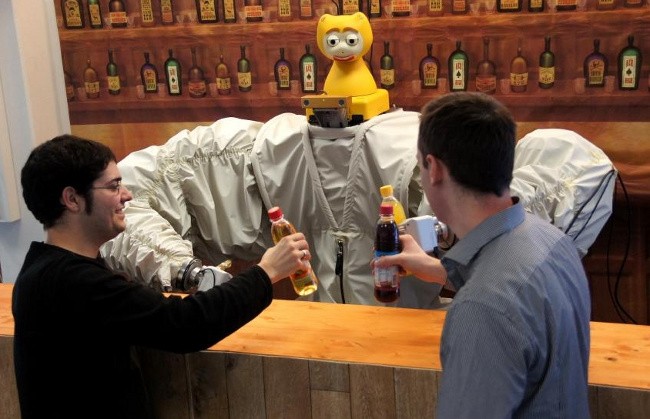A cooperative project funded by the EU researchers from the Excellence Cognitive Interaction Technology (CITEC) of Bielefeld University funded by Edinburgh (UK), Crete (Greece) and Munich (Germany) are working to create the first robotic bartender, called James (Joint Action in Multimodal Embodied Systems). The bartender has been designed to understand human communication and service drinks in the same way that a normal bartender would.
As part of the study into the creation of James, the British, Greek and German researchers invited participants to step into the shoes of their robotic bartender. They looked through the robot James’ eyes and ears and selected actions as part of a repertoire that is being beuilt into him. The results of the study have been published in the open-access research journal Frontiers in Psychology.
“We teach James how to recognize if a customer wishes to place an order”, says Jan de Ruiter who heading Bielefield University’s psycholinguistic contribution into the project. A robot does not automatically recognize which behaviour indicates that a customer near the bar wishes to be served. Is it the proximity to the bar? Or the angle the customer turns to the bar? Or perhaps is it more important whether the customer speaks? The robot perceives a list of details so as to understand the customers.
“We asked ourselves how a human bartender solves the problem and whether a robotic bartender can use similar strategies,” says de Ruiter. Participants of the study were asked to put themselves into the mind of a robotic bartender. They sat in front of a computer screen and had an overview of the the robot data: Visibility of customer, position at bar, position of face, angle of body and angle of face to the robot. This data was recorded during a trial session with the bartending robot James at its own mock bar in Munich. For the trial, customers were asked to order a drink with James and to rate their experience afterwards.
In this way the three academic groups worked to create an artificial embodied agent that supports socially appropriate, multi-party, multimodal interaction. JAMES focuses on the qualitative aspects of task achievement in social situations, and how such tasks can be improved through multimodal communication, rather than the physical aspects of traditional robotics tasks. In particular, JAMES plans to develop the core cognitive capabilities that enable a robot to interact with humans in a socially-appropriate manner, and demonstrate this behaviour in a bartending scenario.
But are we sure we want him?
CLICK HERE for more info into the JAMES project




































